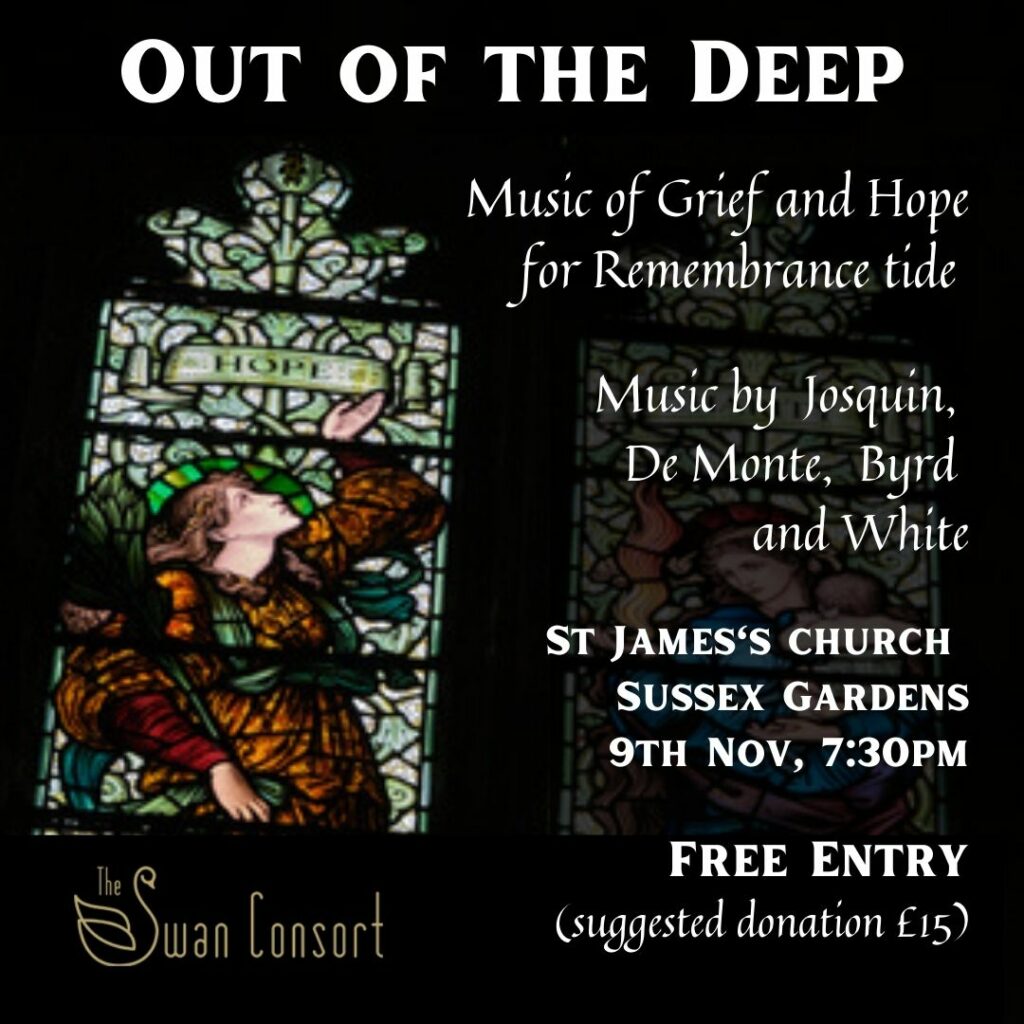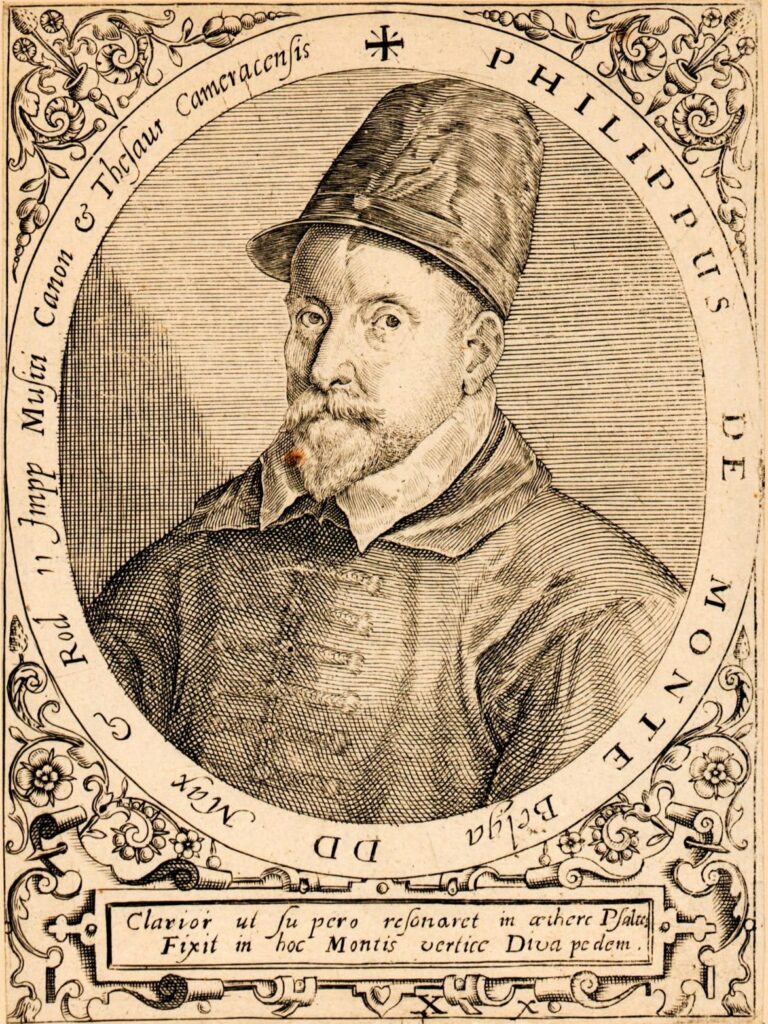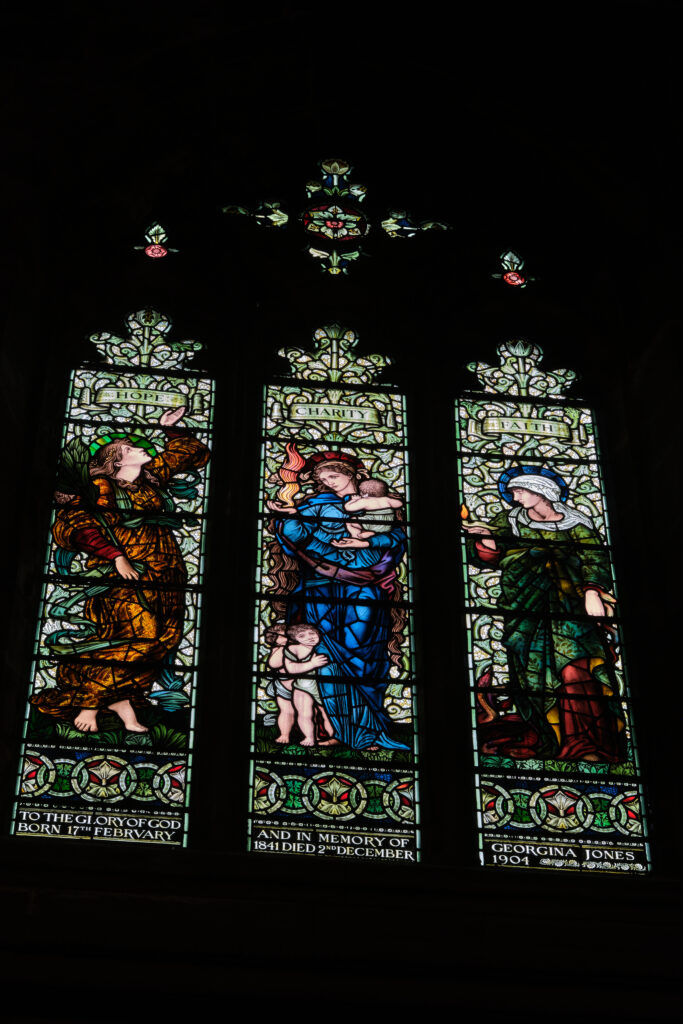
November is a funny month. Poet Thomas Hood describes it as the month of ‘No!’ –
No sun—no moon!
No morn—no noon—
No dawn—
No sky—no earthly view—
No distance looking blue—
And yet, November is a month of so much. November is a month of rain and wind, of cold crisp mornings and of meditation. It is a season in which cultures around the world and throughout history have celebrated light, the triumph of good over evil, and have remembered their dead. In November, we reflect on the summer that has departed and look towards colder, darker months ahead. We dare too, perhaps, to dream of spring.
Out of the Deep is a programme conceived around the conjoined twin emotions of grief and hope. Growing out of the ‘Lamentations’ programme broadcast by The Swan Consort in February this year, Out of the Deep draws together works by 500 Centenary composers Josquin des Prez and Phillippe De Monte with works by their contemporaries and ours to create an atmosphere for reflection this Remembrancetide.
Our programme begins with Lacrimosa, a setting by rising star Tiara Oberoi. Tiara was born and raised in Bangalore, and composed Lacrimosa in response to the Covid-19 pandemic which has been particularly severe in the Indian subcontinent. The piece was the only choral work to make the finals of the ABRSM Commonwealth International Composition Award, where it won in the popular choice category. Lacrimosa is a haunting setting of this text from the Requiem Mass, creating a crystalline soundworld through close harmony and a high tessitura. Tiara has recently moved to the UK to take up a place at the London Central School of Speech and Drama, and we are delighted that she can be with us this evening.

Phillipe de Monte is the unsung hero of tonight’s programme. Whilst 2021 marks the 500 death anniversary of renowned master of polyphony Josquin des Prez, it also marks 500 years since the birth of de Monte. Both composers write in the Franco-Flemish style, and both were enormously influential during their time and in the eras after their death. De Monte was a prolific producer of choral music, writing 1200 madrigals (including the Madrigali Spirituali, some of which we perform this evening) and 40 masses in his lifetime. According to current musicological knowledge, this represents a greater output of madrigals than any other composer.
De Monte’s Miserere Mei, Deus is a short setting of the first two verses of Psalm 57, which is distinct from the more well-known Miserere text set by Allegri and, in our programme, Josquin. De Monte employs simple but effective word-painting techniques, including a humble descending motif for the words ‘Miserere Mei’ (have mercy upon me), and warm harmonies in the appreciation of divine blessings.
Translation: of text, Miserere Mei Deus’:
Be merciful unto me, O God, be merciful unto me, for my soul trusteth in thee:
and under the shadow of thy wings shall be my refuge,
until this tyranny be over-past.
I will call unto the most high God: even unto the God
that shall perform the cause which I have in hand.
This programme also features Ad Te Clamavi by De Monte, another spiritual madrigal demonstrating De Monte’s astounding approach to harmony and the elegance of his approach to melody. The importance of text to De Monte is shown here too, since this is drawn not from a single source but is rather a collage of verses from Psalms 29 and 30, brought together to create a new message of prayer and supplication. From De Monte’s second book of Sacred Songs for five voices, we may consider De Monte’s care over the text as evidence of the importance of meaning and message in his choral writing.
Translation of text, ‘Ad te Clamavi’:
O Lord my God, I have cried to you, and you have healed me.
To thee will I cry, O Lord, and I will make supplication to my God.
In Thee, O Lord, I have hoped, I shall not be put to shame for ever deliver me in thy justice.
Incline your ear to me, make haste to rescue me.
Be my protector and home of refuge to save me.

De Monte was creative with text and coded message in his personal, as well as in his professional life. Perhaps his most famous choral work is his setting of the Super Flumina Babylonis for double choir, which appeared in the hands of one Mr. William Byrd. Byrd was a friend and contemporary of De Monte who he had met at the wedding of Mary Tudor to Phillip II of Spain, in whose choir and court he was a singer and composer. This setting is peculiar because two lines of psalmody appear in the wrong order. In the original text, the Israelites begin by hanging up their harps and weeping, then reflect upon how they have been questioned and led into captivity. In De Monte’s version, the questioning and capturing occurs first, and the motet concludes: How shall we sing the Lord’s song in a strange land? We hung up our harps.
It is widely held that this was indeed a coded message to the Catholic William Byrd, a call to leave the atmosphere of persecution and secrecy he faced under Tudor protestant rule and to rejoin the Spanish court where his Catholicism could be openly practised. Byrd however responded with the following lines of the great psalm in his motet Quomodo Cantabimus:
How shall we sing the Lord’s song: in a strange land?
If I forget thee, O Jerusalem: let my right hand forget her cunning.
If I do not remember thee, let my tongue cleave to the roof of my mouth

Tonight we perform for you one of our favourite motets by William Byrd, Ne Irascaris with Civitas Sancti Tui. Some believe that this piece was composed for the final removal of the blessed sacrament from Westminster Cathedral during the Elizabethan period of the reformation. It is generally accepted that Byrd’s skill as a composer protected him, as his staunch Catholicism was an open secret even during his lifetime. Ne Irascaris and Civitas Sancti Tui were even published during Elizabeth I’s rule in 1589, a bold political statement, since these texts lament the demise of Jerusalem and the laying waste to God’s creation.
We recorded Ne Irascaris individually in lockdown, and presented it as our first Virtual Choir offering during that difficult time. The plea for relief from suffering, the raw and honest expression of loss, resonated with us then as it has with those who mourn across the centuries. Perhaps too Civitas Sancti is a poignant reminder of our responsibilities to the world and the environment as we consider our future and the need to avert permanent damage to our home planet.
Translation of Ne Irascaris and Civitas Sancti Tui:
Be not angry, O Lord, still,neither remember our iniquity for ever.
Behold, see, we beseech thee, we are all thy people.
The holy cities are a wilderness.
Sion is a wilderness, Jerusalem a desolation.

Two large-scale works are showcased in this programme. The first of these is the six-part setting of the Lamentations of Jeremiah by Robert White. Like Byrd, White was a Catholic composer who lived considerable portions of his life practising his faith in secret as the Tudor reformation was established. Born after De Monte and dying before either De Monte or Byrd, White wrote two intricate settings of the Lamentations, a text which is considered to have precipiated the creation of a new structural form for polyphonic writing in response to the layout of this peculiar book of the bible.
Settings of the Lamentations, as in this evocative form we present this evening, alternate between decorative expositions on the letters of the Hebrew alphabet and verses that paint the expressive part of the text. White’s Lamentations a 6 makes use of this form to present impressive canons in the ‘letter’ sections, whilst showcasing the various combinations of the available voices through duets, trios, quartets and full-score writing in the assorted verses. The piece culminates in a sighing cry to Ierusalem in the final moments of the work, the woven textures of crying giving way to a unified call of hope.
The Lamentations a 6 begins at the letter Heth, setting a proportion of the book that is assigned in the lectionary for Good Friday.
Translation of Text, Lamentations a 6:
HETH. The Lord determined to lay in ruins the wall of the daughter of Zion;
he marked it off by the line; he restrained not his hand from destroying;
he caused rampart and wall to lament, they languish together.
TETH. Her gates have sunk into the ground;
he has ruined and broken her bars; her king and princes are among the nations;
the law is no more, and her prophets obtain no vision from the Lord.
IOD. The elders of the daughter of Zion sit on the ground in silence;
they have cast dust on their heads and put on sackcloth;
the maidens of Jerusalem have bowed their heads to the ground.
CAPH. My eyes are spent with weeping; my soul is in tumult;
my heart is poured out in grief because of the destruction of the daughter of my people,
because infants and babes faint in the streets of the city.
LAMED. They cry to their mothers, “Where is bread and wine?”
as they faint like wounded men in the streets of the city,
as their life is poured out on their mothers’ bosom.
MEM. What can I say for you, to what compare you, O daughter of Jerusalem?
What can I liken to you, that I may comfort you, O virgin daughter of Zion?
For vast as the sea is your ruin; who can restore you?
Jerusalem, return to the Lord your God.

Much has been written on Josquin des Prez this 500th anniversary year of his death. Josquin is a composer whose complex and rich opus does not frequently appear in the repertoire of the Anglican Cathedral or Church Choir, which is the beating heart of much of the sacred music tradition in England. However, his legacy is felt throughout the choral repertoire, distinctively in the Renaissance period and arguably beyond.
Josquin des Prez – which is a nickname for the boy born Josse Lebloitte – was a devout Catholic throughout his life. As a rebellious chorister in the pope’s chapel choir, he (or one of his friends) graffiti’d his name in the Sistine Chapel, was the first European composer to have a published book of music dedicated to their works alone, and after a fruitful career in Ferrara went on to leave his property to the church after naturalising as a Frenchman and passing away in that country that he so loved.
Tonight we perform his yearning motet De Profundis, after which our programme is named, the intricate Stabat Mater and his epic setting of the famous Miserere psalm.
Josquin’s music speaks for itself, and is a pleasure to sing. As we discussed with countertenor Guy James (The Gesualdo Six), Josquin excels at setting up a display of mastery over the ‘rules’ of counterpoint, only to break them by subverting the expectations of form, harmony and structure he has invoked. Listen in his works for precise canons that somehow, beneath our noses, slip between our fingers into freewheeling textures. Allow yourself to be jolted emotionally with the coloration (rhythmic and metrical changes) in Stabat Mater, a piece that was kept in the treasured personal songbook of the enigmatic Tudor Queen, Anne Boleyn.
Our programme culminates tonight with Josquin’s Miserere, a motet in three parts that plays a hugely important role in the Christian services of Tenebrae and of Holy Week. Unlike Allegri’s more famous setting, which is strophic and repeats the same melodies over the course of the entire text, Josquin paints every line of this long exposition with deep consideration, drawing out the psychological complexities of this multifaceted text. Throughout, the simple cantus firmus (fixed melody) on ‘Miserere Mei Deus’, drawn from plainsong, returns and reverberates again and again throughout the work, travelling through different voice parts, encased in different harmonic framings that draw out at different times the entire range of emotional character that this simple call can have.
Josquin’s Miserere is an essay on the human experience, traversing despair and longing, faith and woe. Intuitive, empathetic, and heartfelt, this piece brings us close to a personal and yet universal lived experience that transcends time, even by half a millenium.
The texts of the works we perform tonight by Josquin are provided at the end of this article.
Link to #EarlyBrunch, our monthly live brodcast video podcast. In the November edition we spoke about our programme ‘Out of the Deep’ and welcomed guests including countertenor Guy James (The Gesualdo Six) to speak about Josquin’s Legacy, and composer Dawn Walters to speak about her piece Pro Dolorosa
We conclude our programme tonight with a piece written especially for us by friend of the consort, composer Dawn Walters. Dawn is a mezzo-soprano and composer based in East Yorkshire, and wrote Pro Dolorosa for The Swan Consort in February 2021. This meditative and unusual piece sets a lesser-known text from the Divine Chaplet of Mercy, and resulted from Dawn’s personal response to the tragedies of the pandemic. In conversation with us over ‘Early Brunch’ last Saturday, Dawn explained “I wanted to write something for the Swan Consort because you’re an amazing ensemble, beautiful voices, and I wanted to do something that seemed fitting to showcase that. I can’t remember why I specifically chose Pro Dolorosa, but I was looking for something with that kind of a feel, a lament… and I also wanted it to be kind of a tribute to these people [who had died during Covid] and the suffering that people are going through with this.”
Pro Dolorosa premiered in our broadcast Lamentations in February 2021, drawing a warm emotional response from listeners.
Translation of text, Pro Dolorosa:
For the sake of His sorrowful Passion, have mercy on us and the whole world.

Thank you for joining The Swan Consort this evening. We hope you will stay in touch by subscribing to our mailing list or becoming a Friend of the consort: https://theswanconsort.com/membership-join/https://theswanconsort.com/membership-join/
We thank you for your gracious support, which allows us to pay our artists and covers costs including hire of the venue, production of scores, administration and marketing. The total cost to The Swan Consort this evening has been £2285. We suggest a donation of £15 per head, and remain grateful for any contribution as you are able. If you would like to make a significantly larger donation to The Swan Consort (Registered Charity no. 1194785) please speak to Anita tonight, or email anita@theswanconsort.com
To donate £15, text OUTOFTHEDEEP to 70085.
To donate any other amount, text SWAN followed by your donation amount to 70580 to give that amount.
e.g. to donate £7, text SWAN7 to 70580
Texts will cost the donation amount plus one standard network rate message. You will receive further communication including a confirmation text and the option to add Gift Aid to increase the value of your donation by 25% at no additional cost to you. If you would like to donate but don’t wish to hear more from us, please add INFO to the keyword, e.g. OUTOFTHEDEEPNOINFO ; SWAN7NOINFO etc.
Translation of text, Miserere:
Have mercy upon me, O God, after thy great goodness: according to the multitude
of thy mercies do away mine offences.
Wash me throughly from my wickedness: and cleanse me from my sin.
For I acknowledge my faults: and my sin is ever before me.
Against thee only have I sinned, and done this evil in thy sight: that thou mightest be justified in thy saying, and clear when thou art judged.
Behold, I was shapen in wickedness: and in sin hath my mother conceived me.
But lo, thou requirest truth in the inward parts: and shalt make me to understand wisdom secretly.
Thou shalt purge me with hyssop, and I shall be clean: thou shalt wash me,
and I shall be whiter than snow.
Thou shalt make me hear of joy and gladness: that the bones which thou hast broken may rejoice.
Turn thy face from my sins: and put out all my misdeeds.
Make me a clean heart, O God: and renew a right spirit within me.
Cast me not away from thy presence: and take not thy holy Spirit from me.
O give me the comfort of thy help again: and stablish me with thy free Spirit.
Then shall I teach thy ways unto the wicked: and sinners shall be converted unto thee.
Deliver me from blood-guiltiness, O God, thou that art the God of my health: and my tongue shall sing of thy righteousness.
Thou shalt open my lips, O Lord: and my mouth shall shew thy praise.
For thou desirest no sacrifice, else would I give it thee: but thou delightest not in burnt-offerings.
The sacrifice of God is a troubled spirit: a broken and contrite heart, O God, shalt thou not despise.
O be favourable and gracious unto Sion: build thou the walls of Jerusalem.
Then shalt thou be pleased with the sacrifice of righteousness, with the burnt-offerings and oblations: then shall they offer young bullocks upon thine altar.
Translation of text, Stabat Mater:
The grieving mother stood
Next to the cross, tearful,
While her son hung,
Whose groaning soul,
Saddened and grieving,
The sword pierced.
Oh how sad and afflicted
Was that blessed
Mother of the only-begotten,
Who mourned and grieved
And trembled when she saw
The punishment of her illustrious son.
Who is one who would not weep,
If one saw the Mother of Christ
In such torment?
Who could not be saddened
To gaze upon the holy Mother
Grieving with her son?
For the sins of her people,
She saw Jesus in torture,
And subjected to scourges.
She saw her sweet son
Left dying
While he gave up the spirit.
Come, Mother, fountain of love,
Make me perceive the force of grief,
That I may weep with you.
Make my heart bum
In loving Christ the god,
That I may be acceptable to him.
Virgin brightest of virgins,
Do not now be harsh with me,
Make me lament with you.
Make me carry the death of Christ,
The prophecy of his suffering,
And recall his stripes.
Make me wounded by his wounds,
To be drunk with this cross,
For love of the Son.
Flaming and burning,
0 Virgin, may I be protected by you
On the day of judgment.
Let me be protected by the cross,
Forearmed by Christ’s death,
Embraced by grace.
When the body dies,
Let my soul be given
The glory of Paradise.
Amen.
Translation of text, De Profundis:
Out of the depths I have cried to thee, O Lord:
Lord, hear my voice.
Let thy ears be attentive
to the voice of my supplication.
If thou, O Lord, wilt mark iniquities:
Lord, who shall stand it.
For with thee there is merciful forgiveness:
and by reason of thy law,
I have waited for thee, O Lord.
My soul hath relied on his word:
my soul hath hoped in the Lord.
From the morning watch even until night,
let Israel hope in the Lord.
Because with the Lord there is mercy:
and with him plentiful redemption.
And he shall redeem Israel from all his iniquities.
Glory be to the Father,
and to the Son, and to the Holy Ghost.
As it was in the beginning, is now,
and ever shall be,
World without end,
Amen.
